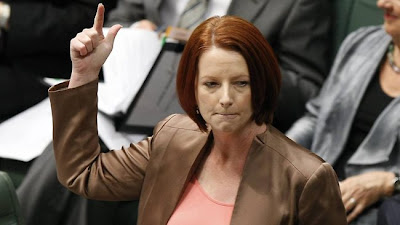Following intense lobbying from business and threats by the independent MP Rob Oakeshott to block the floor price, the government will ditch the mechanism and instead restrict the purchase of cheap overseas permits from developing countries.
A limit on the amount of United Nations-backed permits that Australian companies can buy will effectively prop up the price at home.
 Climate Change Minister Greg Combet plans to scrap the $15 carbon floor price. Photo: Alex Ellinghausen
Climate Change Minister Greg Combet plans to scrap the $15 carbon floor price. Photo: Alex EllinghausenMr Combet also announced plans to link Australia's scheme to Europe's emissions trading scheme from 2015, which is likely to have the effect of matching the two prices.
This could make the carbon price cheaper overall for Australian businesses, though the European price is likely to rise by the end of the decade as the European Union moves to make restrictions of its own.
Australian companies will only be able to meet 12.5 per cent of their liability under the Australian carbon scheme with the UN-backed permits.
And from 2018 - or possibly sooner - Australian companies will be able to sell credits in Europe. This could be a boon for farmers, who can generate credits through changes to their land practices, such as tree planting, though Mr Combet said that aspect was still to be negotiated.
The carbon price, which came in on July 1, will initially be fixed at $23 and will rise slightly over the next two years, when it becomes a floating-price emissions trading scheme.
Europe has the largest emissions trading scheme in the world. A linkage means that carbon permits can be traded back and forth between Australia and Europe. The idea is that the free market then finds the cheapest possible way to reduce carbon. From an environmental viewpoint, it does not matter where the carbon cuts are made.
The floor price was intended to create certainty for potential investors in clean energy. But businesses complained it would be an administrative headache.
Without a restriction of the UN-backed international permits, the Australian price could crash to as low as $3 or $4. The Greens have been concerned that a very low carbon price would not be enough to drive investment in cleaner energy such as wind, solar and wave power.
Today's announcement is also likely to have an effect on negotiations between Energy Minister Martin Ferguson and electricity generators who could be paid billions of dollars to phase out their dirtiest power plants.
The likely price of carbon over the next decade is one factor in deciding the value of these power plants. They may argue that scrapping the floor price raises the value of their assets.
The Greens have already backed the changes.
Independent MP Rob Oakeshott said this afternoon he would also support the legislation.
He said the announcement would protect Australia's emissions trading scheme from some ''very difficult decisions into the future''.
Opposition Leader Tony Abbott said the changes showed the government was all at sea on the carbon tax.
''You can't fix it. You've just got to scrap it,'' Mr Abbott told reporters in Rockhampton.
''We haven't had the carbon tax for two months yet and they've admitted there is a fundamental flaw at the heart of the carbon tax.''
Mr Abbott said there would be a ''huge hole'' in the budget as a result of the decision.
''If you can't take the price for granted, you can't take the revenue for granted, and if you can't take the revenue for granted, you can't rely on the compensation,'' he said.
However Mr Combet said the government would not reduce household assistance payments and tax cuts set up to compensate for the price impacts of the carbon tax.
Asked if he was contemplating any further changes Mr Combet said: ‘‘no’’.
''We will not be cutting any household assistance,'' he said.
''We committed to it and you might recall that there are further tax cuts that have been legislated from 2015 as well.''
View Source






